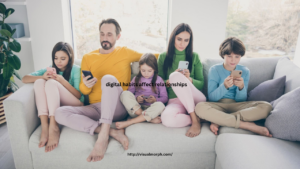In today’s digital age, it’s hard to imagine life without our smartphones. From checking social media to sending messages, these devices are designed to keep us connected 24/7. However, in doing so, they may be doing more harm than good when it comes to our relationships. The question is: Are we dating our phones more than each other? In the rush to stay constantly connected, it’s possible that we’ve begun to prioritize our devices over the people right in front of us.
One of the key reasons smartphones have such a powerful hold over us is their ability to provide instant gratification. From likes and comments to the constant stream of messages and notifications, our phones have become a source of constant stimulation. But this rapid-fire interaction can lead to distraction in relationships. How many times have we been at dinner or sitting with a loved one, only to have our attention diverted to the screen in front of us? It’s all too easy to fall into the habit of checking our phones during what should be quality time with friends, family, or partners.
This behavior—often referred to as “phubbing,” or phone-snubbing—can have detrimental effects on relationships. When one person is glued to their device while the other is trying to engage, it can create feelings of neglect and emotional distance. Instead of sharing meaningful conversations, a partner or friend might feel dismissed or unimportant. Over time, this lack of attention can erode the emotional intimacy that is so crucial in maintaining strong connections.
But it’s not just romantic relationships that are being affected. Phones are also infiltrating our social gatherings, work environments, and even family time. We’ve all been to a social event where people are more focused on their phones than on each other. Whether it’s a group of friends at dinner or a family gathering, the constant checking of phones during these moments can result in missed opportunities for genuine connection. People may be physically present, but they’re mentally and emotionally elsewhere, scrolling through apps and checking messages.
So, why are we letting this happen? The answer lies in the way technology is designed. Smartphones are built to be addictive, with algorithms that keep us coming back for more. Every notification triggers a small release of dopamine in the brain, reinforcing the desire to check our phones repeatedly. This constant cycle can make it difficult to disconnect, even when we know it’s damaging our relationships. The more we turn to our phones for validation, entertainment, or information, the more disconnected we become from the people around us.
It’s not that smartphones are inherently bad for relationships; they can actually enhance them when used mindfully. Technology allows us to stay in touch with loved ones across distances, share experiences, and connect in meaningful ways. However, it’s crucial that we learn to set boundaries and prioritize real-world interactions. Scheduling phone-free times, setting device-free zones, or simply putting the phone away during important moments can help us rediscover the value of direct human connection.
In the end, the key to balancing our relationship with technology is awareness. By recognizing when our phones are taking over our lives and relationships, we can make more intentional choices about how we use them. Technology is a tool, and when used wisely, it can enhance our lives—just as long as it doesn’t replace the deep, personal connections that make life truly meaningful.








